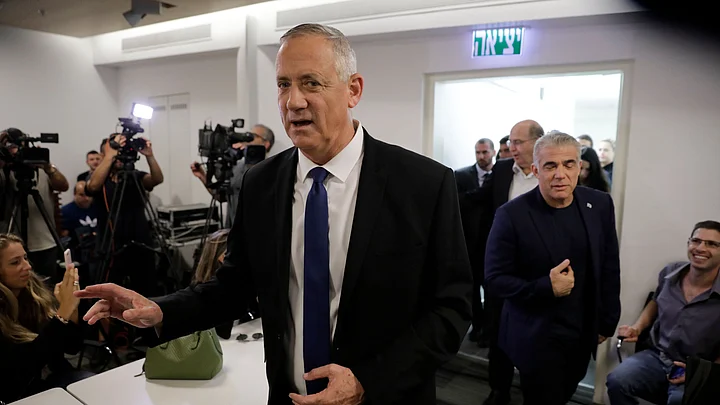Prime Minister Benjamin Netanyahu and his chief rival, Benny Gantz, on Thursday, 19 September each called for the formation of a unity government following Israel's inconclusive national election. But with both men demanding to be prime minister, there were no signs they could break the deadlock.
The rival proposals, marked by deep differences, indicated the country could be headed for a long and contentious period of uncertainty, and politicians on both sides of the aisle warned of being forced into an unprecedented third election in less than a year.
“There is no choice but to form a broad unity government,” Netanyahu said in a video statement. “We cannot and there is no reason to go to third elections.”
After failing to form a coalition following April's election, Netanyahu called Tuesday's vote, only to see the country emerge with another political stalemate.
With nearly all votes counted on Thursday, Gantz's centrist Blue and White party stood at 33 seats in the 120-seat parliament. Netanyahu's conservative Likud stood at 31 seats.
Difficulty In Mustering a Majority Govt
But neither party can muster a majority coalition of 61 seats with their smaller allies. The difference-maker appears to be Avigdor Lieberman, whose Yisrael Beitenu party captured eight seats. Lieberman, known as a wily tactician, has refused to commit to either side and is instead demanding a broad unity government with the two major parties.
Netanyahu's proposal is a nonstarter for Gantz. His Blue and White party has said it will only sit with Likud if Netanyahu steps aside to deal with his legal woes. Netanyahu is expected to be charged in a series of corruption cases in the coming months. Likud lawmakers remain loyal to Netanyahu and have given no signs of wanting to replace him.
Speaking to reporters, Gantz said that as the largest party, he should lead the next government.
“The people chose unity, the people want Israel to come before everything, and therefore, Blue and White under my leadership won the elections,” said Gantz, a former military chief of staff.
Yair Lapid, a senior Blue and White member, accused Netanyahu of dragging the country to a third election and called for him to step down.
“One person is preventing right now the establishment of a liberal unity government. One person stands between what is good for the country and what's good for that person. And country always comes first,” he said.
Netanyahu repeated his offer at a memorial for the late Israeli leader Shimon Peres, where he and Gantz shook hands in their first public encounter since Tuesday's vote. He also offered to meet with Gantz.
Lieberman Unlikely to Help Either of the Two
Neither party appears able to form a majority government without the support of Lieberman, who heads a secular, ultranationalist party and refuses to sit with Netanyahu's ultra-Orthodox religious allies. At the same time, Lieberman is unlikely to sit with leftist Arab parties whose support Gantz would need to secure a majority.
Lieberman believes a broad, secular unity government with Likud and Blue and White is the only way out of the impasse.
The focus will shift next week to President Reuven Rivlin, who will begin consulting with all of the parties on Sunday before he chooses a politician to form a government and be the next prime minister.
Each party will recommend its choice for prime minister, after which Rivlin is to pick the politician who he thinks has the best chance of forming a stable coalition.
Rivlin said the consultations are expected to last two days. After that, he'll announce his pick.
The prime minister-designate then has six weeks to form a coalition. If he fails, the president can give another candidate 28 days to form a government. If that fails, the president could then order a new election, something that has never happened. Rivlin promised he will do everything in his power to prevent a third vote.
The uncertainty has thrown Netanyahu's political future into question.
Israel's attorney general has recommended charging Netanyahu with bribery, breach of trust and fraud in three separate corruption cases. Netanyahu will be given an opportunity to defend himself at a hearing in early October, after which the attorney general will make a final decision.
Netanyahu had hoped to secure a narrow majority of hard-line and religious parties that support granting him immunity from prosecution. With immunity now off the table, Netanyahu is desperate to remain in office.
Israeli law does not require a sitting premier to resign if indicted. But if he is charged, as is widely expected, he would come under heavy pressure to resign amid what would be a huge national distraction.
Tuesday's vote was largely seen as a referendum on Netanyahu, who this summer surpassed Israel's founding prime minister to become the country's longest-serving leader.
During the campaign, Netanyahu cast himself as a seasoned statesman who was the only candidate able to steer Israel through a sea of challenges.
But that message was mixed with frequent attacks on the country's Arab minority, drawing charges of racism. Netanyahu also frequently lashed out at the media, the judiciary and his opponents, claiming they were conspiring to oust him.
Gantz tried to paint Netanyahu as divisive and scandal-plagued, offering himself as a calming influence and honest alternative.
After such a caustic race, there is little public appetite for another bruising campaign.
“I will do everything I can to prevent another general election,” Rivlin said at the memorial service for Peres. “I hear, loud and clear, the voices calling for a broad and stable national unity government.”
(At The Quint, we question everything. Play an active role in shaping our journalism by becoming a member today.)
